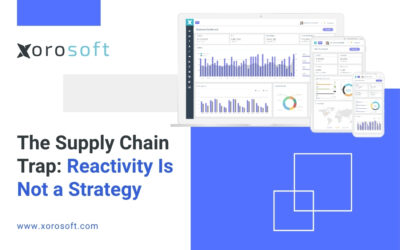
Introduction to ERP systems and their importance in business management
In today’s fast-paced business environment, efficient management of resources and data is crucial for success. This is where Enterprise Resource Planning (ERP) systems play a vital role. An ERP system integrates various functions of a business, such as finance, inventory management, and human resources, into a single, comprehensive platform. This integration allows for better coordination, improved efficiency, and enhanced decision-making.
Implementing an ERP system offers numerous benefits. It streamlines operations, eliminates manual processes, and reduces the risk of errors. Additionally, it provides real-time visibility into business processes, enabling timely and informed decision-making. With an ERP system in place, businesses can optimize their operations, improve customer satisfaction, and gain a competitive edge in the market.
Understanding the role of Key Performance Indicators (KPIs) in quality management
Key Performance Indicators (KPIs) are measurable values that help organizations track and evaluate their progress towards specific goals. In the context of quality management, KPIs provide valuable insights into the effectiveness and efficiency of processes, allowing businesses to identify areas for improvement.
KPIs in quality management can measure various aspects, such as product defects, customer satisfaction, and on-time delivery. By setting specific KPIs and regularly monitoring them, businesses can identify trends, detect issues early on, and take corrective actions to enhance quality.
The benefits of using KPIs in an ERP system
Integrating KPIs into an ERP system brings numerous benefits to businesses. Firstly, it provides a centralized platform for monitoring and analyzing KPI data across different departments. This enables a holistic view of the organization’s performance and facilitates data-driven decision-making.
Secondly, KPIs in an ERP system enable real-time tracking of metrics, allowing businesses to promptly identify deviations from desired targets. This proactive approach enables timely interventions to address issues and prevent them from escalating.
Furthermore, KPIs in an ERP system streamline reporting processes by automating data collection and analysis. This reduces manual effort, improves accuracy, and enables faster generation of actionable insights. With KPIs, businesses can monitor performance, identify bottlenecks, and drive continuous improvement in quality management.
Overview of XoroERP’s robust ERP solution
XoroERP is a leading provider of robust ERP solutions designed to streamline business processes and drive operational excellence. With its comprehensive suite of modules, XoroERP offers an integrated platform that covers various aspects of business management, including inventory management, accounting, and quality management.
XoroERP’s ERP system stands out for its user-friendly interface, scalability, and flexibility. It caters to businesses of all sizes and industries, providing tailored solutions to meet specific needs. XoroERP’s commitment to continuous innovation ensures that their ERP system stays up-to-date with the evolving business landscape.
Key features and functionalities of XoroERP’s Inventory Management System
XoroERP’s Inventory Management System is a crucial component of their ERP solution. It offers a wide range of features and functionalities to effectively manage and control inventory across the supply chain.
With XoroERP’s Inventory Management System, businesses can accurately track stock levels, monitor product movements, and optimize inventory replenishment. The system provides real-time visibility into inventory, enabling businesses to avoid stockouts, reduce carrying costs, and improve order fulfillment.
Additionally, XoroERP’s Inventory Management System supports demand forecasting, allowing businesses to anticipate customer demand and plan their procurement accordingly. This proactive approach helps minimize excess inventory and reduce the risk of stock obsolescence.
How XoroERP’s ERP system streamlines accounting processes
XoroERP’s ERP system includes a comprehensive accounting module that simplifies financial management and ensures accurate record-keeping. The accounting module integrates seamlessly with other modules, providing a holistic view of financial data.
With XoroERP’s accounting module, businesses can automate routine accounting tasks, such as invoice generation, expense tracking, and financial reporting. This automation improves efficiency, reduces errors, and frees up valuable resources for more strategic activities.
Furthermore, XoroERP’s ERP system enables real-time financial visibility, allowing businesses to monitor cash flows, track expenses, and analyze profitability. The system provides customizable financial reports and dashboards, empowering businesses with actionable insights for informed decision-making.
The significance of KPIs in XoroERP’s quality management module
XoroERP’s quality management module incorporates KPIs to measure, monitor, and improve the quality of products and processes. The module enables businesses to define and track relevant KPIs, ensuring that quality goals are met consistently.
By leveraging KPIs in XoroERP’s quality management module, businesses can identify areas of improvement, track performance trends, and implement targeted actions. The module provides real-time visibility into KPI data, enabling businesses to make informed decisions and drive continuous quality improvement.
XoroERP’s quality management module also supports root cause analysis, enabling businesses to identify the underlying causes of quality issues and implement corrective actions effectively. With the module’s comprehensive reporting capabilities, businesses can generate detailed quality reports and share them with stakeholders for transparency and accountability.
Setting up and customizing KPIs in XoroERP’s ERP system
XoroERP’s ERP system offers a user-friendly interface for setting up and customizing KPIs. The system allows businesses to define their own KPIs based on their unique quality management requirements.
To set up KPIs in XoroERP’s ERP system, businesses need to identify the relevant metrics and determine the desired targets. The system provides a range of predefined KPI templates, making it easier for businesses to get started. Additionally, businesses can customize these templates or create their own KPIs from scratch.
XoroERP’s ERP system also allows businesses to set thresholds for KPIs, enabling automatic alerts when performance deviates from desired targets. This proactive approach helps businesses take immediate corrective actions and prevent quality issues from escalating.
Analyzing and interpreting KPI data for quality management improvement
Once KPIs are set up in XoroERP’s ERP system, businesses can start tracking and analyzing the data to drive quality management improvement. The system provides various tools and functionalities to facilitate data analysis and interpretation.
XoroERP’s ERP system enables businesses to generate detailed reports and visualizations based on KPI data. These reports and visualizations help businesses identify trends, patterns, and anomalies, providing valuable insights for decision-making.
Furthermore, XoroERP’s ERP system supports drill-down capabilities, allowing businesses to analyze KPI data at different levels of detail. This enables businesses to pinpoint specific areas of improvement and implement targeted actions.
By regularly analyzing and interpreting KPI data, businesses can gain a deeper understanding of their quality performance, identify improvement opportunities, and drive continuous quality improvement.
Integrating KPIs with XoroERP’s other modules for comprehensive business insights
One of the key advantages of XoroERP’s ERP system is its seamless integration of KPIs with other modules. This integration enables businesses to gain comprehensive insights into their operations and make data-driven decisions.
For example, integrating KPIs with XoroERP’s Inventory Management System allows businesses to monitor inventory-related metrics, such as stock turnover and carrying costs. This integration helps optimize inventory levels, reduce costs, and improve order fulfillment.
Similarly, integrating KPIs with XoroERP’s accounting module enables businesses to track financial metrics, such as profitability and cash flow. This integration provides a holistic view of financial performance, enabling businesses to make informed decisions and drive profitability.
By integrating KPIs with various modules in XoroERP’s ERP system, businesses can obtain a holistic view of their operations, identify interdependencies, and implement strategies to optimize overall performance.
Choosing Xorosoft ERP for your quality management needs
With its robust ERP system and comprehensive quality management module, XoroERP is the ideal choice for businesses seeking to unlock success with KPIs. XoroERP’s user-friendly interface, scalability, and flexibility make it suitable for businesses of all sizes and industries.
By choosing XoroERP, businesses can benefit from a comprehensive suite of modules, seamless integration of KPIs, and real-time visibility into performance metrics. The system empowers businesses with actionable insights, enabling them to drive continuous improvement in quality management.
To experience the power of XoroERP’s ERP system and its KPI-driven quality management module, book a demo with Xorosoft today.
Conclusion: Unlocking success with KPIs in XoroERP’s robust ERP system
In today’s competitive business landscape, effective quality management is crucial for success. By integrating Key Performance Indicators (KPIs) into XoroERP’s robust ERP system, businesses can unlock success by driving continuous improvement in quality.
XoroERP’s comprehensive suite of modules, seamless integration of KPIs, and real-time visibility into performance metrics provide businesses with the tools and insights needed to optimize quality management. By setting up and customizing KPIs, analyzing and interpreting KPI data, and integrating KPIs with other modules, businesses can achieve operational excellence and gain a competitive edge.
Unlock your success with XoroERP’s KPI-driven quality management module. Book a demo with Xorosoft today and experience the power of XoroERP’s robust ERP system.









